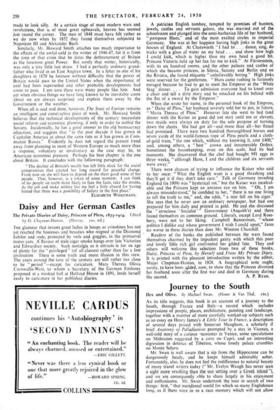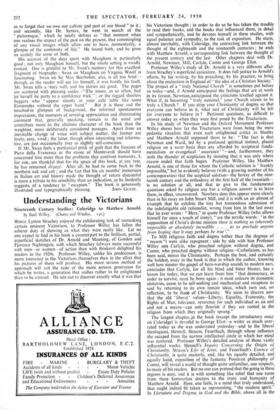Journey to the South
Ilex and Olive. By Michael Swan. (Home & Van Thal. z6s.)
As its title suggests, this book is an account of a journey to the South, through France and Italy—a record which includes impressions of people, places, architecture, painting and landscape, together with a number of more carefully worked-up subjects such as an essay on Henry James's A Little Tour in France, a description of several days passed with Somerset Maugham, a scholarly if brief Anatomy of Palladianism prompted by a stay in Vicenza, a well-told story of a curious -ncounter in Venice, some speculations on Mithraism suggested by a cave on Capri, and an interesting digression in defence of Tiberius, whose lonely palace crumbles on Monte Solaro.
Mr. Swan is well aware that a sip from the Hippocrene can be dangerously heady, and he keeps himself admirably sober. Fortunately, also, he does not feel the indifference to natural beauty of many travel writers today (" Mr. Evelyn Waugh has never seen a sight more revolting than the sun setting over a Greek island "), and we are consequently able to share largely in his enjoyment and enthusiasms. Mr. Swan undertook the tour in search of two things: first, "that meridional world for which so many Englishmen long, as if there were in us a race memory which will not allow us to forget that we owe our culture Ind part of our blood" to it ; and secondly, like Dr. Syntax, he went in search of the "picturesque," which he neatly defines as "that moment when one realises the impact of the past on the present, that commingling of any visual images which allow one to have, momentarily, a glimpse of the continuity of life." He found both, and he gives us acutely the sense of both.
His account of the days spent with Maugham is particularly good ; not only Maugham himself, but the whole setting is vividly evoked. One is grateful to Mr. Swan's memory for this excellent fragment of biography ; Swan on Maugham on Virginia Woolf is fascinating. Swan on Sir Max Beerbohm, alas, is all too brief— though, as the reader will see for himself, it was hardly his fault. Mr. Swan tells a .tory well, and his stories are good. The pages are scattered with pleasing asides—"The moon, as so often, had let herself be party to a confidence trick " ; or the ragged shoeless beggars who "appear silently at your café table like some Eumenides without the upper hand." But it is these and the touched-in glimpses of background, the informal spontaneous impressions, the moments of sensitivs appreciation and illuminating comment that, generally speaking, remain in the mind and contribute more to the ultimate character of the book than the weightier, more deliberately considered passages. Apart from an inevitable change of voice with subject matter, the former are lively, easy, vivid ; the latter, though often interesting and informa- tive, are just occasionally ever so slightly self-conscious.
If Mr. Swan feels a puritanical prick of guilt that the frescoes of Piero della Francesca or the music of Monteverdi should have concerned him more than the problems that confront humanity, I, for one, am thankful that for the space of this book, at any rate, he has remained (Wage. After all, he had to come back to the northern oak and ash ; and the fact that his six months' immersion in Italian art and history made the thought of return distasteful is more a tribute to his sensibility than an indication, as he modestly suggests, of a tendency to "escapism." The book is generously
illustraten and typographically pleasing. JOHN GUEST.



































 Previous page
Previous page